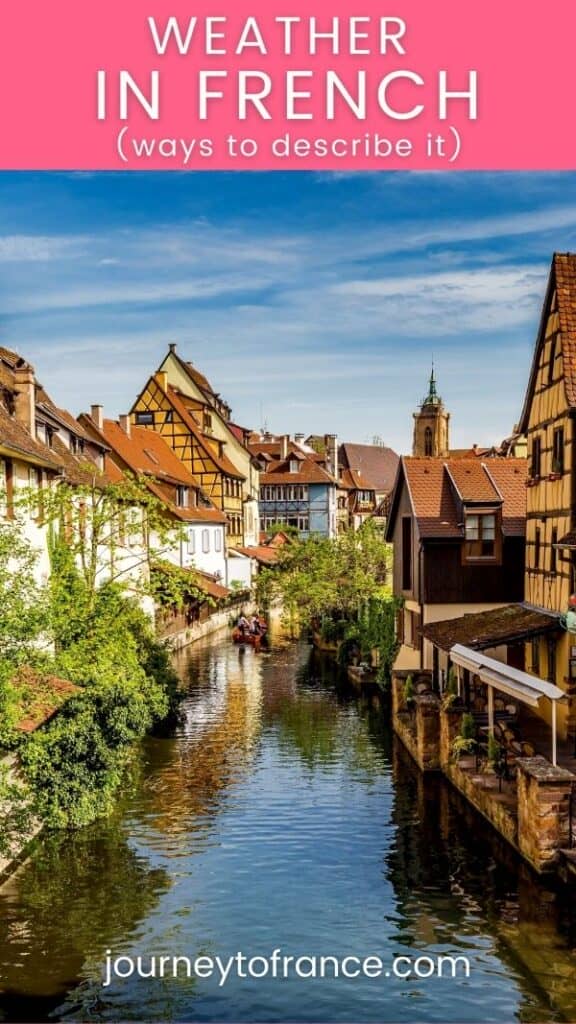Are you planning a trip to France soon and want to make sure you can converse about the weather in French?
Talking about the weather is not that easy because there is a lot of weather vocabulary to learn, including some phrases with very precise constructions and expressions.
The good news is that you only need to understand a few key weather terms to get by. Here’s a quick primer on weather terminology in French, from asking to describing whether it is good or bad.
Things you'll find in this article
Weather In French

1. Asking About the Weather in French

You may be on your way to another region in France, excited and curious about what to expect when you get there.
Did you bring the right clothes? Are your shoes okay? What’s the weather like in Honfleur, in Colmar, in Montpellier, or in Nice? Here’s what you should learn and remember to ask about the weather in French.

- Quel temps fait-il?
This expression is construed as either “How is the weather?”, “What is the weather like?” or “How is it out there?” This is the standard way in which you can inquire about the weather in French.
The general answers to this question can be any of the two:
- Il fait beau – It’s nice out.
This expression refers to whatever is associated with good weather.
- Il fait mauvais – It’s not nice out.
This expression refers to whatever is associated with bad weather.
However, if you want to understand or give specific answers to “Quel temps fait-il?“, refer to the list in the next item.
2. Describing The Weather in French

Along with knowing how to ask the weather, you must also learn certain terms to better understand the answers that you may get.
These are also great additions to your French vocabulary so that you may be able to describe the weather in French when asked.
- C’est agréable – It’s warm.
- Il fait froid – It’s cold.
- C’est gelé. – It’s icy.
- Il y a du vent. – It’s windy.
- C’est orageux or il y a de l’orage – It’s stormy.
- Il y a du soleil. – It’s sunny.
- Il n’y a pas de nuages. – It’s clear.
- C’est nuageux. – It’s cloudy.
- Il fait très chaud. – It’s hot.
- C’est humide – It’s humid
The word “Très” (very) can be used to emphasise that it’s not just cold or warm, but extremely cold or extremely warm. Here are a few examples:
- Il fait très froid. – It’s very cold.
- Le temps est très agréable. – It’s very warm.
Want to learn French for free? Rocket Languages helps you to learn French faster and more effectively.
[su_button url=”https://www.rocketlanguages.com/french/premium?type=freetrial&aff=crogador&tid=jtf” target=”blank” background=”#FF6088″ size=”5″]STUDY FRENCH FOR FREE[/su_button]
3. Talking About Extreme Weather / Natural disasters in French

France is one of the world’s most vulnerable countries to the risks of extreme weather. It is prone to heatwaves, floods, and storms, and some parts of the country experience bitterly cold winters and scorching summers.
We always want to plan ahead and visit France during the months when the weather is typically pleasant.
However, in the event that we have to cancel or are experiencing extreme weather conditions while in the country, here is a list of French terms for weather.
First, you must start your sentence with “C’est,” which is French for “It is,” and then use any of these weather descriptions.
- une vague de froid – cold spell
- un cyclone – cyclone
- une giboulée / un déluge – downpour / sudden downpour
- la canicule – heat wave
- un ouragan de catégorie 1, 2, 3, 4, 5 – hurricane category 1, 2, 3, 4, 5
- une tempête / un orage – storm
- une tornade – tornado
- un cyclone tropical / un orage tropical – tropical storm
- un typhon – typhoon
4. Other Weather Terms in French

Seen lighting during a gray afternoon in Paris? Loving the good weather in Mont Saint Michel? Surprised by the gust of wind as you walk the streets of Cannes?
Here are more ways to describe the weather in French, which will come in handy as you explore France.
- le beau temps – good weather
- des intempéries (f) – bad weather
- une rafale – gust of wind
- la grêle – hail
- le flocon de neige – the snowflake
- le nuage – the cloud
- un coup de foudre – bolt of lightning
- une inondation – flood
- une marée haute – flood tide
- un raz-de-marée – tidal wave
- un ballon-sonde – weather balloon
- une carte météorologique – weather chart
Want to learn more French phrases? Check out our language guides below:
Get fluent fast now. Upgrade your French language skills with our free classes online today.
[su_button url=”https://www.rocketlanguages.com/french/premium?type=freetrial&aff=crogador&tid=jtf” target=”blank” background=”#000000″ color=”#ffffff” size=”5″ center=”yes”]SIGN UP FOR FREE[/su_button]
- Have A Great Day In French
- Happy Birthday In French
- Good Morning In French: Rules And Tips
- How Are You In French: 20 Ways To Say It

Hi, I’m Christine – a full-time traveler and career woman. Although I’m from the Philippines, my location independent career took me to over 40 countries and lived in 4 continents in the last 10 years, including France. A self-proclaimed Francophile, I love everything France.
